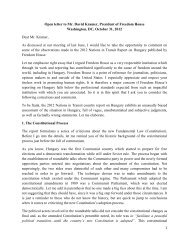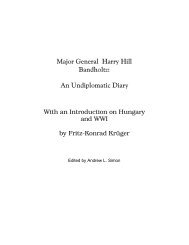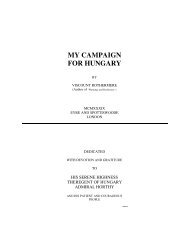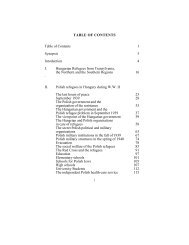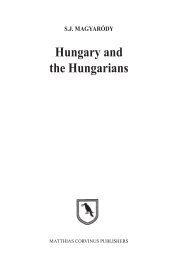The Fate of Western Hungary 1918-1921 - Corvinus Library ...
The Fate of Western Hungary 1918-1921 - Corvinus Library ...
The Fate of Western Hungary 1918-1921 - Corvinus Library ...
You also want an ePaper? Increase the reach of your titles
YUMPU automatically turns print PDFs into web optimized ePapers that Google loves.
conference contain numerous, flagrant instances <strong>of</strong> partisan treatment. Such as<br />
one general <strong>of</strong> the Entente not recognizing the November 3, <strong>1918</strong> Padua truce<br />
agreement signed by another Entente general, Armando, Diaz. Or some foreign<br />
ministers vetoing their prime minister’s suggestions, see later the case <strong>of</strong> David<br />
Lloyd George. Some Hungarian historians see the existence <strong>of</strong> the Hungarian<br />
Soviet Republic as playing a key role in the annexation <strong>of</strong> <strong>Western</strong> <strong>Hungary</strong>.<br />
This does not stand up to scrutiny because, as we have already stated, this<br />
territory was given as compensation to Austria for South Tyrol, annexed to<br />
Italy. In this decision, a key role was played by President Wilson, who<br />
supported Austria, in opposition to the French, in its unrestrained and odious<br />
claims against <strong>Hungary</strong>.<br />
<strong>The</strong> Hungarian memoranda handed to the peace conference, especially the<br />
French-language speech <strong>of</strong> Albert Apponyi (and its English and Italian<br />
summary) did not go totally without effect. Italian PM Nitti and British PM<br />
Lloyd George suggested at the Supreme Council meeting <strong>of</strong> February 25, and<br />
again on March 3, that the question <strong>of</strong> <strong>Hungary</strong>’s borders be sent back for<br />
reconsideration, based on available materials and “without bias.” <strong>The</strong> British<br />
PM, citing relatively accurate numbers, pointed out that the peace agreement<br />
will place 2,750,000 Hungarians, meaning “a third <strong>of</strong> the Hungarian<br />
population,” under foreign rule, which “will not be easy to defend.” (<strong>The</strong> reality<br />
was closer to 3,500,000, most <strong>of</strong> whom lived immediately alongside the newly<br />
drawn borders, now in a foreign country, and what was (or used to be) an<br />
integral part <strong>of</strong> the Hungarian ethnic bloc.) <strong>The</strong>re will be no peace in Europe,<br />
Lloyd George predicted, “if later it becomes known that <strong>Hungary</strong>’s claims are<br />
justified and entire Hungarian communities were given to Czechoslovakia or<br />
Transylvania [sic! meaning Romania—J.B.] like a herd <strong>of</strong> cattle, just because<br />
the conference refused to discuss the Hungarian issue.” 209<br />
Subsequently, a French language memorandum was prepared, which was<br />
discovered among the papers <strong>of</strong> Vittorio Cerruti, the chief Italian representative<br />
in Budapest. <strong>The</strong> author suggested plebiscites in some <strong>of</strong> the Hungarianpopulated<br />
areas earmarked for annexation, including <strong>Western</strong> <strong>Hungary</strong>. “<strong>The</strong><br />
dismemberment <strong>of</strong> <strong>Hungary</strong> will happen – reads one <strong>of</strong> the documents –<br />
without taking into the least consideration the will <strong>of</strong> the affected people. <strong>The</strong>y<br />
are herded from one country into another like reluctant flocks in a barn.” It then<br />
continued: “More than half <strong>of</strong> these people are Hungarian or German and<br />
nothing entitles us to the conclusion that the other half totally wishes to<br />
separate from its old country.” And finally, a conclusion: “Only a plebiscite<br />
would be able to conclusively determine the will <strong>of</strong> the population, and it seems<br />
impossible for us to deem this demand as a quantié négligeable (negligible<br />
209 Documents on British Foreign Policy 1919-1939. Ed. by P. T. Bury & R. Butler.<br />
First Series. Vol. VII. London, 1958, pp. 384-388. Cited by Romsics, Ignác:<br />
Magyarország története a 20. században [Hungarian history in the 20 th century].<br />
Budapest, 1999, p. 140.<br />
88




